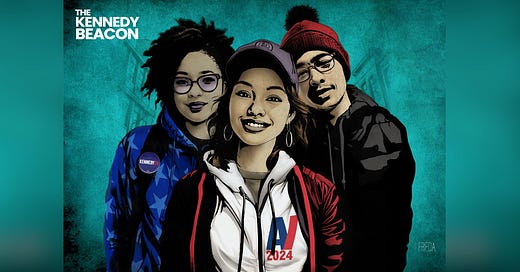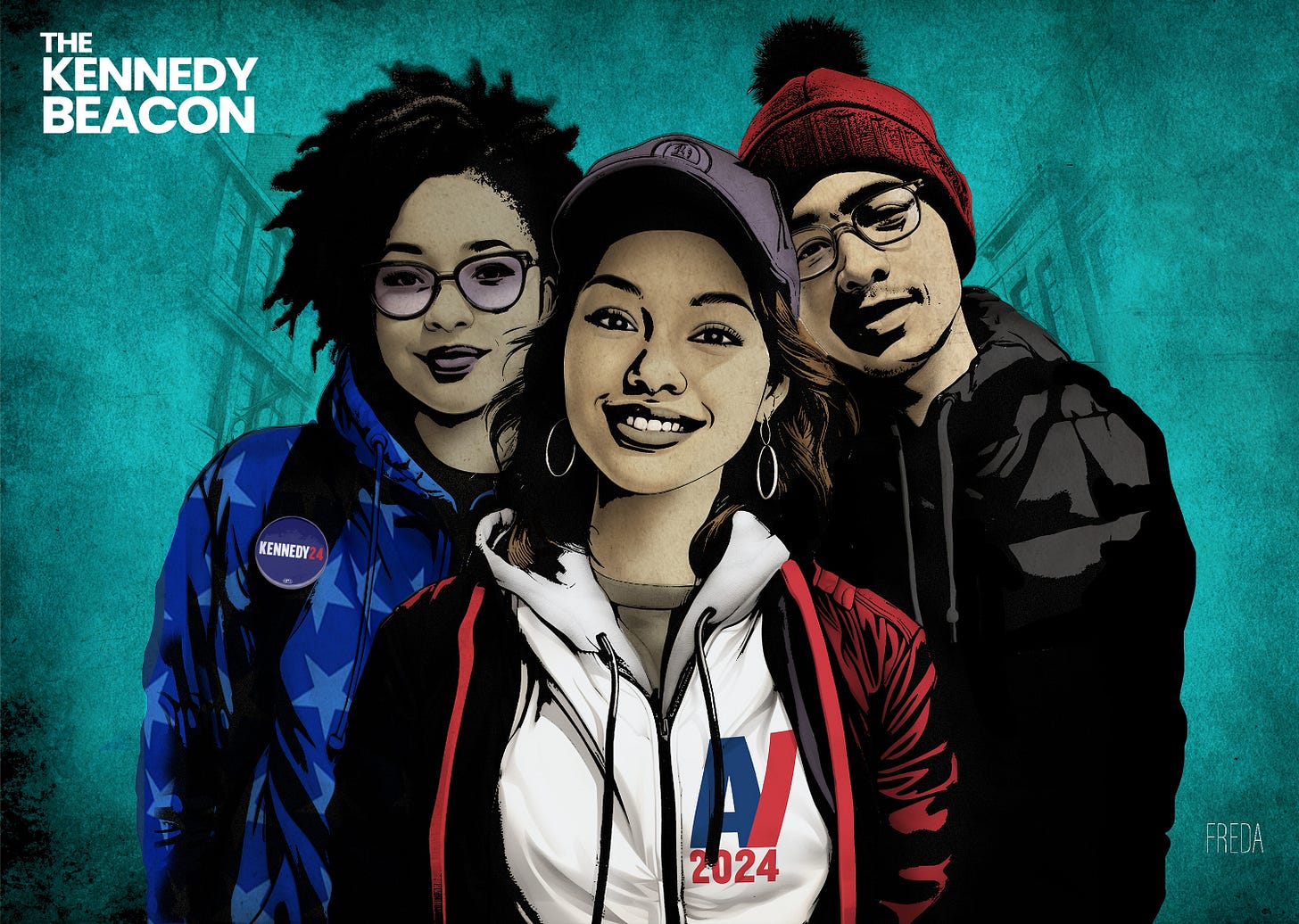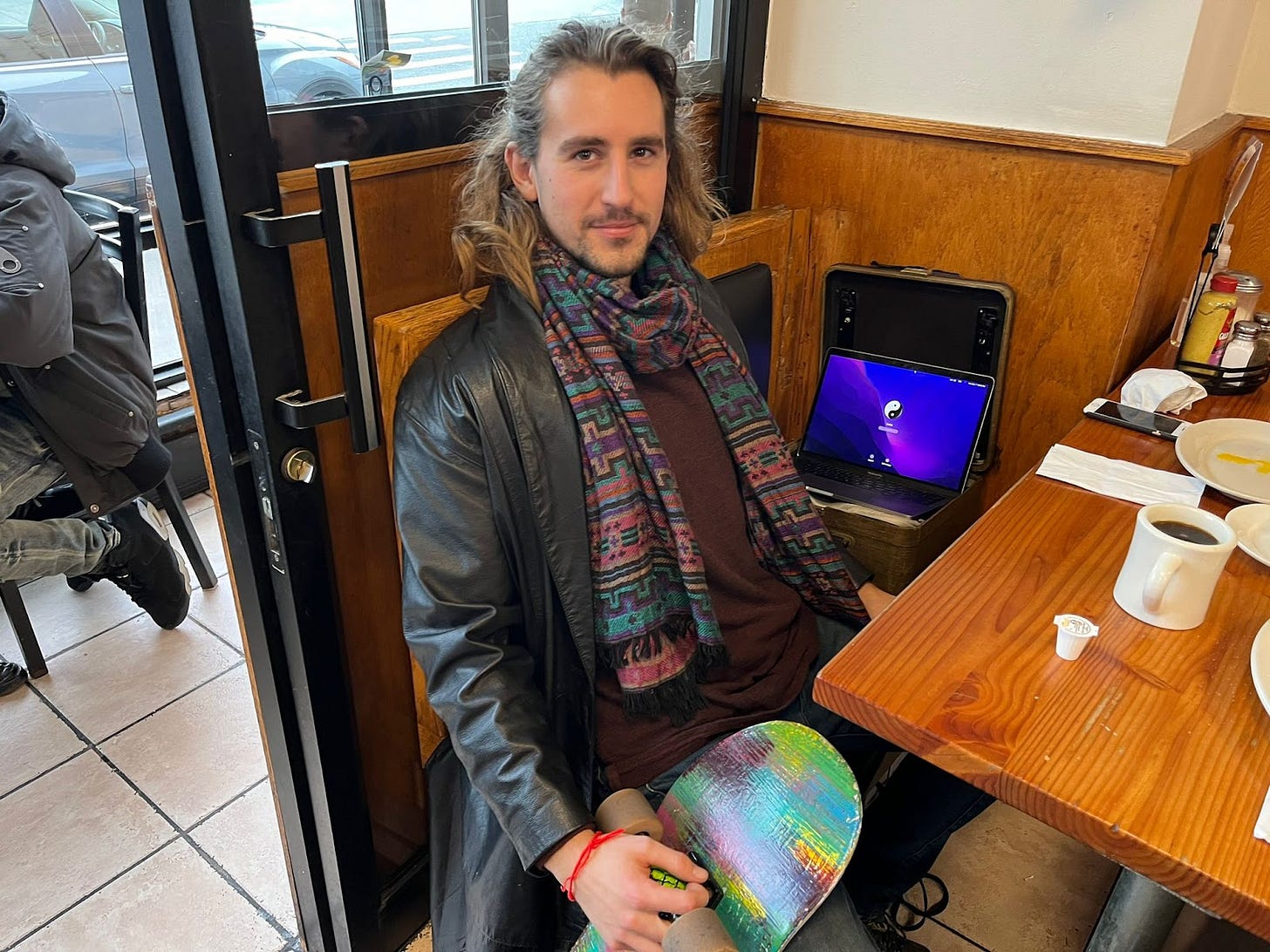Millennial and Gen Z Voters See Kennedy as the Unifying, Optimistic Leader We Need
By Sanna Hannele Voltti, The Kennedy Beacon
“The millennials and Gen Z are repelled by the toxicity, the pettiness, and, more than any of that, by the dishonesty. They crave authenticity. So, no, the problem isn’t the young people. The problem is the politics. I am committed to inaugurating a politics worthy of their engagement.” — Robert F. Kennedy Jr.
By Sanna Hannele Voltti, The Kennedy Beacon
The fervor of younger people’s support for Robert F. Kennedy Jr. in his presidential bid is turning heads and prompting conversations about the changing dynamics of American politics.
Young voters have a lot of say in the matter. According to the Center for Information & Research on Civic Learning and Engagement, 50 % of young voters (18-29) voted in the 2020 presidential elections, an 11 % higher turnout than in 2016. That group of young voters has gradually increased in size and influence in recent years, becoming a larger portion of eligible voters and an increasingly significant force in shaping the outcomes of elections, including the 2024 presidential race.
According to Statista, almost half of people aged 18-24 are registered to vote, while over 60% of those aged 25 to 34 and nearly 70% of individuals aged 35 to 44 are registered as of 2022.
A recent New York Times/Siena College poll found that RFK Jr. is leading with young voters in six key battleground states. Among voters under 45 in those states, Kennedy polls at 32%, Biden at 30%, and Trump at 29%.
The Kennedy Beacon spoke with a few Kennedy-supporting students to better understand their hopes, concerns, and goals.
Students for Open Inquiry
At MIT, 21-year-old mathematics major Adam Deng is greatly concerned about economics. “The youth are very focused on how am I going to be able to buy a house, how am I going to be able to feed myself, what resources are available,” Deng tells the Beacon. “Financial stability and freedom. That's the main concern.” He wants to encourage Kennedy to speak more openly to young people about the housing crisis and about community issues that really affect young voters.
Deng is a captain of a group called MIT Students for Open Inquiry, whose goal is to spread free speech and to open the Overton Window – to identify and expand the range of ideas that define the spectrum of acceptable public discourse on government policies. The group’s goal, he says, “is to get speakers who don’t necessarily agree with the mainstream or the establishment narrative, but who on their own, through their actions, through what they've done, have merit.”
One speaker the group hosted recently was Steve Kirsch, an entrepreneur, writer, and founder of the Vaccine Safety Research Foundation. Kirsch’s speech on November 30 attracted a full house, including everyone from undergrad students to MIT alumni in their fifties and sixties.
Ironically, getting Kirsch permission to speak in an MIT auditorium named after him – he donated $2.5 million in 1998 for its construction – was difficult. The administration was unwelcoming because some of his recent public stances are controversial. They would not permit him to speak at MIT unless a professor or a student organization invited him. An invitation from Students for Open Inquiry made the speech in Kirsch Auditorium possible.
Deng tells the Beacon that during his presentation, Kirsch spoke of the need for a fearless leader, one who will hold the CDC and FDA accountable. “And then there was a big poster of RFK in a cowboy-like pose,” Deng recalls, “and the entire auditorium just erupted. That was the moment when I knew Steve endorsed RFK Jr.”
Deng says there are things he likes about Kennedy and also things he doesn’t agree with. Students for Open Inquiry is not endorsing any political candidates, nor is Deng as its captain. “But I like the Kennedy people. I like what they’re doing to get grassroots American people to stand up for their own rights. And Bobby’s been doing that for a long time.”
Students for Kennedy
Elias Cunningham, a 16-year-old high school student in Washingtonville, New York, is putting together two new groups: Students for Kennedy and New York for Kennedy.
Cunningham’s family is not political, yet he got into politics young – at eight years old. He started as a Democrat but later found Donald Trump appealing. “His foreign policy, his tough stance on the world stage, the anti-establishment messaging” were part of that appeal, Cunningham tells the Beacon. “But even though I like Trump, I think he is not the guy we need right now. The guy we need right now is, of course, Bobby.”
Most importantly, Cunningham says, the United States needs a president who will heal the divide. “Our nation is so polarized, and there’s a poison within our media that’s feeding on to the people.”
The biggest concerns on young people’s minds are economics, climate, and building peace in the world. Cunningham thinks Kennedy is the right person to lead us in addressing all these problems. “We need him for the country to heal and reunite,” he says, “and also on the world stage so we can continue to be strong and to work with other countries to create peace rather than war as the establishment.”
New Generation, New Vision
Luca Barton-Cain, a 24-year-old recent Vassar graduate, has always known about Kennedy through his mom, who has long been involved in Children’s Health Defense. “I was never in that mainstream bubble of delusion,” he tells the Beacon.
Barton-Cain started his studies at Vassar in economics, then switched to biology when he realized that academic economics was not for him. He got into politics in high school, was part of the Ron Paul movement, and later found Donald Trump intriguing. He was not fully in support of the latter at the beginning, but he said the waves Trump made were interesting. He thinks that a part of Kennedy’s appeal is similar to the Trump phenomenon.
Why do people like Kennedy? “I think that it has a lot of the same appeal as Trump. But RFK is more genuine,” Barton-Cain says.
“Trump was appealing because people saw an outsider,” he continues. “RFK has made himself an outsider by being principled and being good. But his background is not as an outsider, which is great, because that means he knows how things work in a way that Trump doesn’t. So he would actually have the chance to make good on his promises, like to get out of the forever wars and reform the immigration disaster.”
When asked about concerns on young people’s minds, Barton-Cain also mentioned the economy and the wars. Yet, from what he’s seen, young people are not interested in voting. “They see everyone as a liar. I was talking to someone the other day, who was saying, ‘I’m sick of having to choose a side. Why should I vote for anyone?’ He did say that he’d probably vote for Kennedy if he had to. But it's just a complete lack of hope.”
That’s why he sees Kennedy’s impact as even more meaningful: he can restore the hope in young people, to heal what Barton-Cain calls ‘Gen Z pessimism’. “He can reinvigorate the sense of optimism and national pride that people my age don’t have,” he says. “Trump pretended he was going to do this. I think RFK has the chance to actually reinvigorate the sense of national pride and optimism that my age doesn’t have any familiarity with.”
Positivity and Optimism
What all three of these students have in common is that they’ve lost their faith in traditional politicians and are worried about the country’s future. Adam Deng puts it this way: “Americans are no longer optimistic about the future, and we need a sort of maybe a spiritual awakening or a new reawakening of American values, then that can really hit a lot of people.”
“I want him to create the America I want to grow up in,” says Elias Cunningham, who thinks that young people can have a strong (though partially hidden) effect in the 2024 elections. That’s because he knows a lot of young people who support Kennedy, but not openly, in fear of the social stigma often given those who back an independent candidate.
The biggest stigma inflicted on Kennedy is the one disingenuously called “antivax.” Cunningham has found that the “media paints a picture that he’s an anti-vaxxer crazy loony when the truth is that he is pro-safe-vaccines.”
Deng has a direct message to the campaign: “If they want to win, focus a lot on local and state issues and defend free speech at all costs. I think RFK has that appeal. I think RFK is not really a polarizing figure. He’s more of a community builder through his environmental actions.”
“But I think Kennedy does have that ability to be positive,” Deng adds. “So if he can stay positive, he has a good shot.”
Kennedy’s authenticity and transparency in addressing local, regional, and national challenges win the trust of young voters. His willingness to engage directly with the public – coupled with his track record in activism, legal advocacy, and important courtroom victories for Americans – resonates with a generation seeking genuine leadership and accountability in politics.
As Kennedy said in announcing his independence on October 9, 2023, in Philadelphia, “The millennials and Gen Z are repelled by the toxicity, the pettiness, and, more than any of that, by the dishonesty. They crave authenticity. So, no, the problem isn’t the young people. The problem is the politics. I am committed to inaugurating a politics worthy of their engagement.”
Cunningham hopes that if he, “as a 16-year-old, can take the time to listen to Bobby and recognize the importance of him, hear his ideas and know that he is right for the country, a grown adult should be able to do the same.”







I'm thrilled that so many young people are excited to vote for Kennedy. But there needs to be some way of reaching the Baby Boomers. I'm one, and used to be more liberal and progressive until the Trump Derangement Syndrome and Covid Craziness changed my political thinking. But many of the people in their 60s and 70s won't even sign to get Bobby on the ballot because they're so afraid of doing anything that may help get Trump reelected. We need to work on a message for them.
As a Boomer, I am profoundly grateful to read and to hear the voices of the younger generations. It is the Youngers who are inheriting a deeply sick and sad world. It is they who deserve the right to claim and carry the torch in this world now. My deep prayer is that that those who are awake to the truth of it all, are able to encourage their peers to show up, to support and to vote for Bobby.. This is our last best hope for a world we choose to be alive in. Please dear Youngers, be steady and be fearless in speaking with your parents, teachers, elders, and all those still trapped inside of the illusions that have brought us to this moment in human history and the destruction of all that is sacred and life-giving. Please know that I and many of us are here cheering you on!